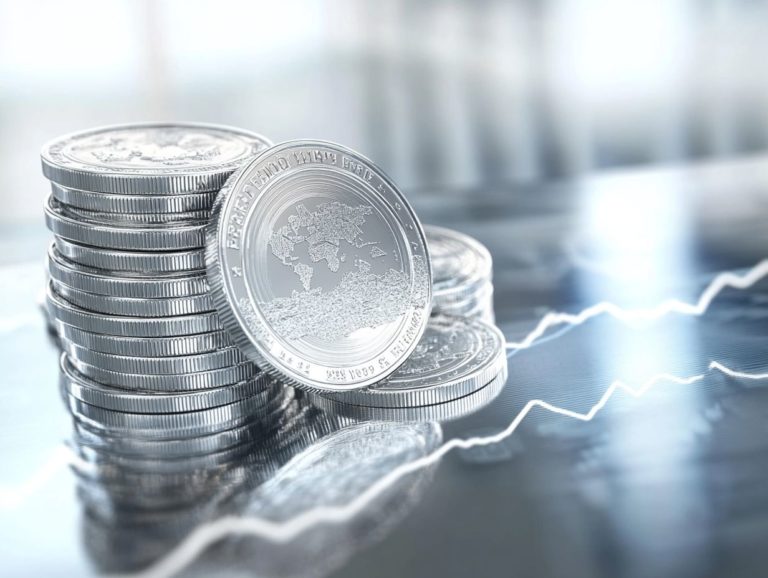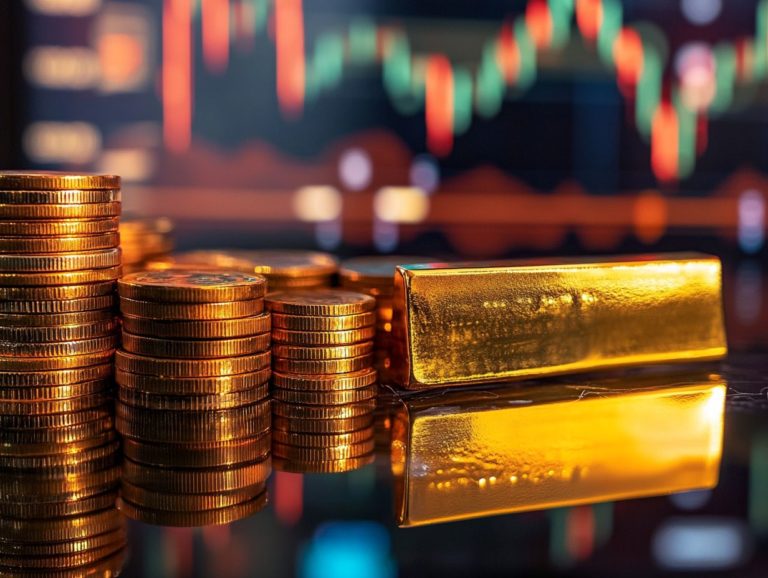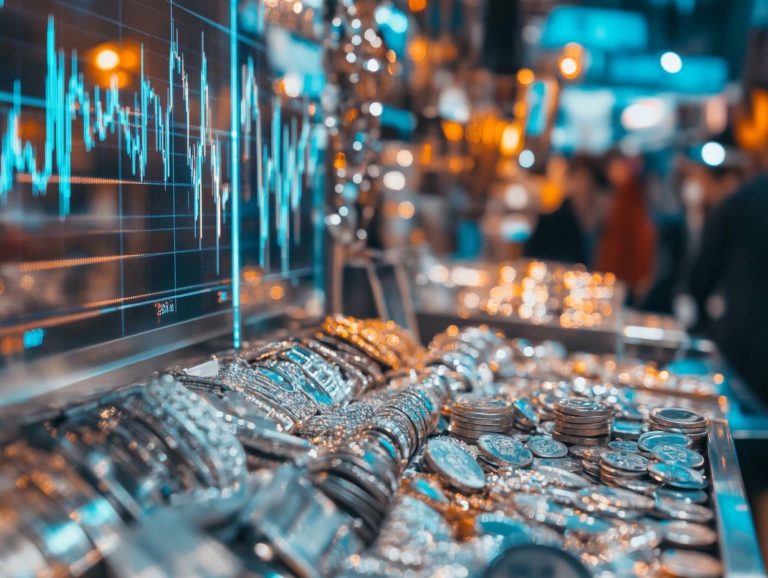The Role of Speculation in Gold Prices
Gold has long been viewed as a safe-haven asset and a reliable store of value. However, its prices are swayed by a complex array of factors none more captivating than speculation. Join us as we explore how speculation shapes the gold market, shedding light on its definition and the profound effects it has on pricing.
You ll delve into historical case studies that illustrate the dual-edged impact of speculation while uncovering practical strategies for managing the associated risks. Whether you re an investor looking to enhance your portfolio or simply someone curious about the gold market, this exploration will deepen your understanding of gold prices and the dynamic forces that influence them.
Contents
- Key Takeaways:
- Understanding Gold Prices
- The Role of Speculation in Gold Prices
- Historical Examples of Speculation in Gold Prices
- Impact of Speculation on the Gold Market
- Managing Risks in Gold Speculation
- Frequently Asked Questions
- What is the role of speculation in gold prices?
- How does speculation impact gold prices?
- Is speculation the only factor affecting gold prices?
- Why is gold often seen as a safe haven for investors?
- Can speculation drive gold prices to extreme levels?
- What are some potential risks of speculation in gold prices?
Key Takeaways:
- Speculation plays a significant role in determining gold prices, involving predictions about future market trends and buying or selling based on those predictions.
- While speculation can lead to increased volatility in the gold market, it also provides opportunities for investors to profit by buying low and selling high.
- To mitigate risks associated with speculation in gold prices, investors can use strategies such as diversification, setting stop-loss orders, and closely monitoring market trends.
Understanding Gold Prices
Understanding gold prices requires a deep dive into the various factors that influence their fluctuations. Key aspects to consider are supply and demand dynamics, central bank policies, economic uncertainty, inflation rates, and the performance of the U.S. dollar.
Gold has historically been regarded as a safe-haven asset, especially amidst market turmoil. This positions it as a vital component of investors’ portfolios during periods of geopolitical uncertainty and financial crises.
As you look ahead to 2024 and 2025, expect these factors to persist in shaping the gold market, influencing gold production, demand, and the overall investment landscape.
Factors That Influence Gold Prices
Key factors that affect gold prices include supply and demand, inflation rates, and the strength of the U.S. dollar. Supply and demand strongly affect prices; shifts in mining output or geopolitical tensions can drastically alter availability, causing prices to swing.
If inflation rises, your money buys less, making gold an appealing option to protect your wealth. Investors often turn to tangible assets like gold as a safeguard against value erosion when purchasing power diminishes.
Currency debasement also impacts how much gold you can buy, making it a compelling store of value, particularly during economic downturns. Furthermore, economic instability can cause fluctuations in both consumer and industrial demand for gold, which significantly impacts its market value.
The Role of Speculation in Gold Prices
Speculation significantly influences gold prices, with investors constantly responding to market sentiment and global economic conditions. This ongoing reaction can lead to price fluctuations across various financial instruments, including exchange-traded funds (ETFs) and gold shares.
Definition of Speculation
Speculation involves the art of buying and selling assets like gold with the expectation of making profits based on future price movements in the financial markets.
This strategy often focuses on capitalizing on short-term fluctuations rather than investing for the long haul. In gold investing, speculators keep a keen eye on market trends, geopolitical events, and economic indicators that sway gold prices.
Unlike long-term investors, who may focus on steady growth and the intrinsic value of their assets, speculators thrive on volatility, eager to seize opportunities as markets change rapidly. Their actions can dramatically influence market dynamics, pushing prices up or down based on prevailing sentiments and conditions.
This makes speculation a pivotal element in shaping how gold is viewed in today s investment landscape.
How Speculation Affects Gold Prices
Speculation can wield considerable influence over gold prices, introducing volatility that stems from market sentiment, investor behavior, and reactions to economic news.
When you perceive geopolitical instability or economic downturns, it’s common to gravitate toward gold as a safe haven. This drives demand and elevates prices. For example, during tense periods such as military conflicts or trade wars the sudden spike in speculative buying can lead to significant price increases.
In economic crises like recessions or financial collapses, uncertainty tends to heighten the appeal of gold. This prompts investors to speculate on its future value, further inflating prices.
As this cycle plays out, these speculative behaviors can generate erratic market patterns, rendering gold prices exceptionally sensitive to external developments.
Historical Examples of Speculation in Gold Prices
Historical examples of speculation in gold prices reveal intriguing patterns. Significant price fluctuations frequently align with economic downturns, geopolitical tensions, and financial crises. This phenomenon illustrates the profound impact of investor psychology on the value of this precious metal.
Explore these trends to uncover how external factors shape market behavior and influence gold s worth.
Case Studies and Analysis
By analyzing case studies of gold price movements during times of heightened speculation, such as the financial crisis of 2008, you can gain valuable insights into how the market works.
During that turbulent period, global economic uncertainty led many investors to gravitate toward gold, viewing it as a safe haven asset. The sharp decline in stock markets, combined with the bailouts of major financial institutions, sparked fears of inflation and currency devaluation. This rise in demand pushed gold prices higher, clearly demonstrating how fear and speculation can influence value. Understanding the role of central banks in gold prices can further illuminate these market dynamics.
By looking into historical trends like these, you can better understand the intricate relationship between economic indicators and investor sentiment. This knowledge will ultimately enable you to navigate your investment strategies more effectively.
Impact of Speculation on the Gold Market
Speculation plays a significant role in the gold market, affecting it in both positive and negative ways. It shapes market sentiment, influences liquidity, and alters the investment landscape for gold as an asset class.
Understanding these dynamics can provide valuable insights into your investment decisions.
Benefits and Drawbacks
The benefits of speculation in the gold market include enhanced liquidity and the chance for you to capitalize on price movements. However, be aware of the drawbacks, such as increased volatility and the risks of market manipulation.
For instance, when speculators anticipate rising gold prices due to economic uncertainty, their buying behavior can drive up demand and swiftly elevate prices. This provides an excellent opportunity for you to profit if you play your cards right.
On the flip side, if a large group of speculators suddenly opts to sell off their holdings perhaps swayed by an external market event it can trigger rapid price declines, leaving you feeling blindsided.
The gold market has experienced instances of manipulation, where coordinated actions create artificial price fluctuations. This impacts individual portfolios and the stability of the broader market.
This shows that speculation can be both a way to profit and a risky venture that requires careful navigation.
Managing Risks in Gold Speculation
Managing risks in gold speculation is essential for you as an investor seeking to safeguard your portfolio from inevitable volatility and price fluctuations.
By taking a proactive approach to risk management, you can navigate the complexities of gold investment with confidence and resilience.
Now that you understand speculation’s impact on gold, consider your investment strategy wisely.
Strategies for Reducing Risk
Effective strategies to reduce risk in gold speculation are essential, especially during economic uncertainty and market turmoil. You can employ various techniques to safeguard your capital.
Utilizing hedging approaches provides a protective layer against sudden market fluctuations. Setting stop-loss orders limits potential losses and establishes a clear exit point before committing significant resources.
When combined with careful market trend analysis, these strategies help you make informed decisions that adapt to changing conditions.
This fosters a resilient approach to gold speculation. You can effectively withstand the inevitable ups and downs of the market.
Frequently Asked Questions
What is the role of speculation in gold prices?
Speculation influences gold prices. Actions by investors and traders can significantly affect gold’s market value.
How does speculation impact gold prices?
Speculation causes fluctuations in gold prices. Investors buy or sell gold based on their expectations of future market conditions.
Is speculation the only factor affecting gold prices?
No, speculation is just one of many factors. Other influences include supply and demand, economic conditions, and central bank policies.
Why is gold often seen as a safe haven for investors?
Gold is viewed as a safe haven because it is less affected by market volatility or economic crises. In uncertain times, investors may turn to gold as a store of value.
Can speculation drive gold prices to extreme levels?
Yes, speculation can drive gold prices to extreme highs or lows, especially during heightened market speculation or fear.
What are some potential risks of speculation in gold prices?
Speculation can lead to market inefficiencies and create false demand or supply, causing price distortions. It can also exaggerate price swings, complicating future price predictions.















